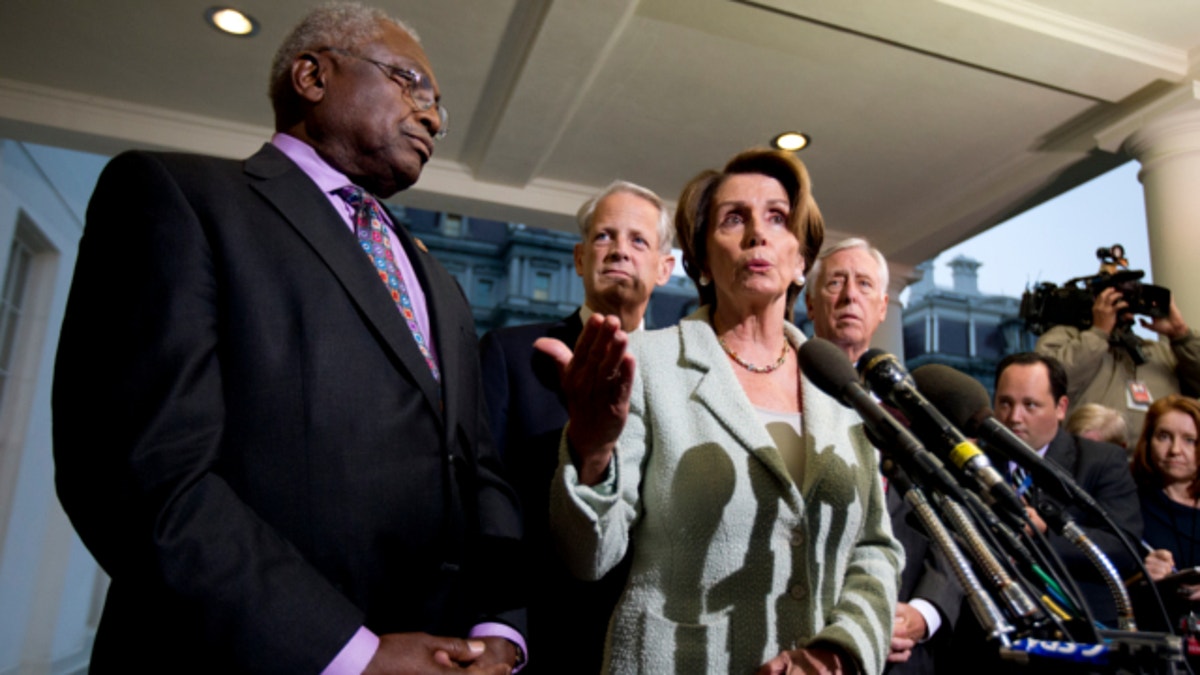
Oct. 9, 2013: House Minority Leader Nancy Pelosi, D-Calif., front right, together with, from left, Assistant Minority Leader Rep. James Clyburn, D-S.C. Rep. Steve Israel, D-N.Y. House Minority Whip Rep. Steny Hoyer, D-Md., speaks to reporters following a meeting with President Obama at the White House in Washington, (AP)
Conversations with a number of Democratic leadership staffers, on both the House and Senate sides, suggest that as the partial shutdown grinds on, Democrats continue to believe that time is on their side -- not least because they believe they maintain in reserve a powerful, and somewhat surprising, ally: Wall Street.
“Come October 14, 15, 16 – those days right before the debt ceiling [reaches its expiration, on October 17] – there is going to be intense pressure on Boehner to cut a deal,” said one senior Senate Democratic staffer. “Because his allies on Wall Street and in the Chamber of Commerce are going to be turning on CNBC and Fox Business and seeing how rattled the markets are by the prospect of default.”
Further forcing House Speaker John Boehner’s hand, these Democrats allege, are his own prior statements, both in public and to concerned business groups, that there will not be a default, and the polling to date. Specifically, the Democrats point not only to current polling but to the surveys that accompanied the eventual reaching of a deal on the debt ceiling back in 2011. They say their review of polling data from two years ago shows that as a default becomes more possible, with the passage of crucial time, the public becomes more informed about it and more alarmed by it.
These staffers dismissed the new Moody’s report – which asserts that there is no direct linkage between the expiration of the debt ceiling and “default,” per se, and accordingly no direct linkage between the debt ceiling expiration and the “creditworthiness” of the United States – as “an outlier … not aligned with the consensus position.”
On the House side, Democratic leadership sources said they have done all they could to provide cover for Boehner to cut a deal.
“At this point, we are identifying all mechanisms, vehicles, motions, whatever you want to call it, to bring this to an end and remove all the barriers for House Republicans to play their role in doing so,” said a top House Democratic leadership aide. “But at the end of the day, he’s going to have to find his own way out of the box he’s painted himself into.”
These moves include agreeing to the $986 billion figure and taking off the table, for any post-shutdown conference committee, the parliamentary maneuver known as “motion to instruct.” The removal of this option by House Democratic Leader Nancy Pelosi, the aides said, is unprecedented for the House minority and effectively makes it impossible for the Democrats to attach the equivalent of amendments to the work of a conference committee.
On the House side, some Democrats pointed to what they see as signs that the Republicans may soon be willing to sever ObamaCare from their resolutions. Among these signs was the failure of Rep. Paul Ryan, R-Wis., to mention the health care law in his op-ed in The Wall Street Journal on Wednesday.




